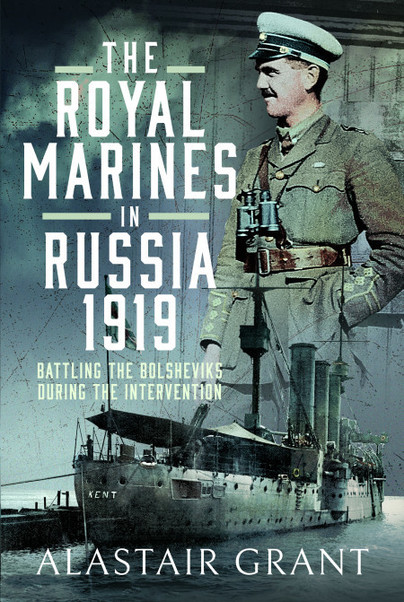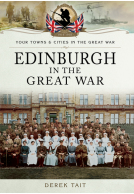The Royal Marines in Russia, 1919 (ePub)
Battling the Bolsheviks During the Intervention
Imprint: Pen & Sword Military
File Size: 12.8 MB (.epub)
Pages: 224
ISBN: 9781399038782
Published: 10th April 2024
| Other formats available - Buy the Hardback and get the eBook for £1.99! | Price |
|---|---|
| The Royal Marines in Russia, 1919 Hardback Add to Basket | £15.40 |
'Grant sets an historical context but his achievement lies in recounting the detail - some mundane, some terrifying – of a small group of men led by the remarkably resourceful Jameson as they make their small mark on events of Tolstoyan scale. It’s a story that deserves its own record and in Grant it has found an author who has blended personal investment and historical objectivity in perfect balance.' - Robert Fry
At the height of the Russian Civil War in 1919 Britain poured in thousands of troops and vast amounts of munitions to assist the White Russian opponents of Lenin’s Communist forces. This was despite exhaustion following the Great War and the Spanish flu epidemic.
One man involved was 23-year-old Royal Marines officer, Thomas Henry Jameson. His mission took him and his men on a journey of 5,000 miles from Vladivostok to the battlegrounds not far from Moscow. As part of a White Russian Flotilla they steamed down the huge Kama River and fought a series of successful battles against superior Bolshevik gunboats. Later they were forced to retreat and, becoming cut off behind enemy lines, had to fight their way out knowing that, if captured, they faced summary execution. Eventually after a long and hazardous journey they made it back to their parent ship.
Jameson and his Marines faced a multitude of hazards in this cruel civil war including disease which he described as ‘the biggest challenge of all.” In some other British units there were reports of mutiny due to terrible conditions. Yet, as this fascinating book describes, remarkably he succeeded not only to keep his men alive but inflict significant damage on a ruthless enemy.
The author has been meticulous in his research, even travelling to Russia to visit the area described. The book is beautifully produced, with contemporary black-and-white photographs.
Pennant Magazine - THE JOURNAL OF THE FORCES PENSION SOCIETY - Autumn 2024
Captain Jameson was 24 years old during the period described and managed to bring home every one of his detachments safely. This is an object lesson in leadership, resourcefulness and bravery that could arguably be required reading for any young military officer today.
“A most adventuresome journey which…must certainly be regarded as unique even in the annals of their much travelled Corps” is how Alastair Grant’s grandfather, Tom Jameson, summed up his detachment’s participation in the Russian civil war in 1919.
Sir Roderic Lyne (former Ambassador to Russia)
A century on, Alastair Grant has given a vivid description of an extraordinary episode.
24 year-old Captain Jameson found himself leading a small party of volunteer Marines fighting and winning naval battles against the Bolsheviks, not on the sea, but on the river Kama in the middle of Russia; not on ships, but on converted paddle-steamers, tugboats and barges, using artillery pieces which had been lugged five thousand miles from Vladivostok.
Grant describes Jameson’s struggles to integrate Russian soldiers with his own disciplined force and to hold the line against Trotsky’s Red Army as Admiral Kolchak’s White forces fell apart and retreated in chaos. In the face of daunting obstacles, Jameson managed to extricate his beleaguered detachment and shepherd them across Siberia and homewards from Vladivostok. Having survived battle against superior forces, immense difficulties of communications and supply, temperatures ranging through 70 degrees Centigrade, and the vicious mosquitoes of the Urals summer, Jameson laconically ended his report on the affair that he “considered the threat of Typhus and Cholera the most to be feared”.
Alastair Grant has painstakingly pieced together this unlikely story from Jameson’s and other diaries, official archives, personal accounts and histories of the period, supplemented by his own visit to the places where the detachment fought and his perspective as an officer of the Royal Marines. His book is a remarkable tribute to his grandfather.
The Russian Revolution and subsequent civil war have received a lot of attention in recent years, including an authoritative volume by the doyen of British military historians, Anthony Beevor. To some extent this might be attributable to centennial echoes and certainly events in Ukraine – the crucible of the civil war – has attracted public and specialist interest.
Rob Fry
For Beevor, it’s all about the heroic scale of Russian physical geography and historical tragedy. Alastair Grant in his Royal Marines in Russia 1919 weaves a more intimate tale, not least because it recounts the improbable adventures of his grandfather, Captain (later Major General) Tom Jameson, from Russia’s Pacific coast to its European river system. It’s a familial story in two senses in that not only does it connect a bloodline but also a regimental family, as both Grant and Jameson served as Royal Marines.
Grant sets an historical context but his achievement lies in recounting the detail - some mundane, some terrifying – of a small group of men led by the remarkably resourceful Jameson as they make their small mark on events of Tolstoyan scale. It’s a story that deserves its own record and in Grant it has found an author who has blended personal investment and historical objectivity in perfect balance.
About Alastair Grant
Alastair Grant, whose father and both grandfathers served in The Royal Marines, was succeeded by his son as a fourth generation. Alastair joined in 1961 aged 17 ½ and served for 26 years. His first operational tour was in Tanganyika stabilising the government after army mutinies, followed by a posting to The Aden Protectorate, now Yemen, where he was wounded and evacuated to the UK. Other overseas tours included Singapore and the USA and six winters in Norway. He served in Northern Ireland during the troubles. His civilian career was as a consultant helping firms win new business, presentation skills and other communication challenges. He is a keen sailor with one twin-handed Trans-Atlantic under his belt.















